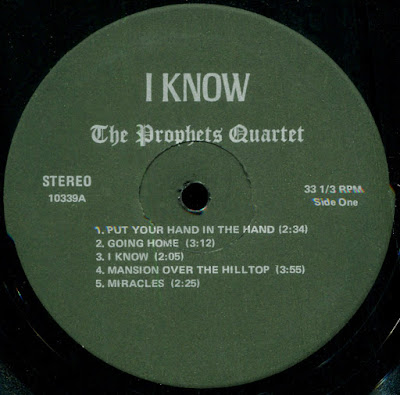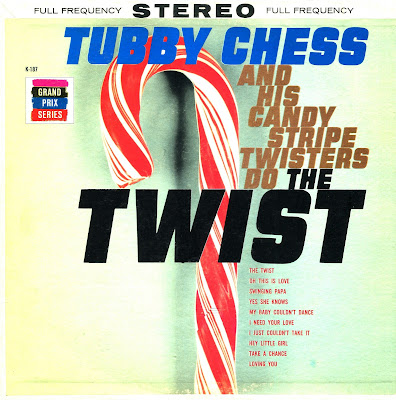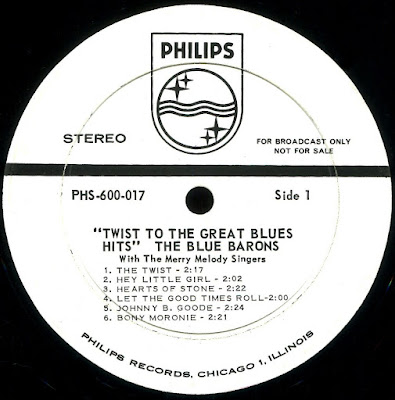It would appear that I accidentally moved the LP while scanning the A side. Kind of a cool effect, actually. Meanwhile, I had to clone out some upper right hand discoloration that, while only mildly noticeable on the jacket, showed up as an epic blemish on the scan. I guess my old Epson scanner does a superior job, considering the highly detailed results I get. Which, on the minus side, means extra work for me on the photoshopping front. But do I complain? Not me!
The Prophets Quartet of Knoxville TN (actually, this LP says Nashville) enjoys 30 entries on Discogs, so I guess the group was pretty popular. And I just today found another one of theirs--like today's LP, it's a Queen City Album, Inc. production with no label name, and no notes, and stock front cover art. Small world. Oh, and no author/composer credits for the songs. And that's why this post didn't go up last night, as planned--being my obsessive self, I just had to find out who wrote these familiar titles, and in all but one instance I was able to, though it was not a quick process. As ever, I found myself amazed at the lack of online author/composer information when it comes to gospel songs, sometimes for even the most famous titles. I mean, maybe I can understand a fairly involved search for Lee Roy Abernathy's Miracles Will Happen on That Day, especially since it's billed merely as Miracles, but Prayer Is the Key and What a Happy Day?? I believe I found the author/composer of the latter via a sheet music scan on Amazon, and all I can conclude is that, except for the folks who write the words and tunes for these numbers, few others give a hoot. It's as if authorship isn't even a thing in gospel music--all that matters is who recorded a given number. And, often, we're talking twenty different people. There must be folks who think Johnny Cash or Lester Flatt wrote half the classic gospel titles. Or Don Gibson, Nitty Gritty Dirt Band, Jim Reeves, and so on.
And did you know that Anne Murray was the first person to record Put Your Hand in the Hand? I didn't, but I do now. I remember the recording by Ocean, at least. Now, Hand is an example of a "pop" gospel number that became a standard, like In the Sweet By-and-By, Whispering Hope, The Bible Tells Me So, and another title which I just forgot. Meanwhile, the Prophets' Will the Circle Be Unbroken is the version associated with A.P. Carter (Can the Circle...), and I have yet to decide whether Circle has a folk source or if the Carter version was a variation on the 1907 Ada R. Habershon/Charles H. Gabriel classic. With gospel LPs, you never know which one you're going to get. And, in today's performance, we hear the standard text variation, "There's a better home awaiting...," which was originally "Is a better home awaiting...?" This makes the song a happier one.
Save for the toe-tapping title waltz, I Know, the only other uptempo numbers are Miracles (Will Happen on That Day) and What a Happy Day, but the pace never seems to drag, possibly because of the highly professional performances and the superior fidelity. (A great combination.)
Why Should I Worry? may or may not be the song Why Should I Worry When Jesus Is Near? by Woodie W. Smith, though I'm doubting it, since that song goes back at least as far as 1915, and these words sound very post-1915. At any rate, to the excellent gospel. And remember: "A phonograph record is a miracle of modern ingenuity," especially if we "take care to use the proper needle at the correct turntable speed." I guess QCA felt it was better to share this vital advice than to tell us anything about the group...
DOWNLOAD: The Prophets Quartet--I Know (Queen City Album 10339; 1971)
Put Your Hand in the Hand (Gene MacLellan)
Going Home (Bill and Gloria Gaither)
I Know (Mullican-Rouse-Tripp)
Mansion Over the Hilltop (Ira Stanphill)
Miracles (Lee Roy Abernathy)
What a Happy Day (Jack W. Campbell)
Prayer Is the Key (Samuel T. Scott-Robert L. Sande)
Will the Circle Be Unbroken
How Beautiful Heaven Must Be (A.S. Bridgewater-A.P. Bland)
Why Should I Worry?
Lee











